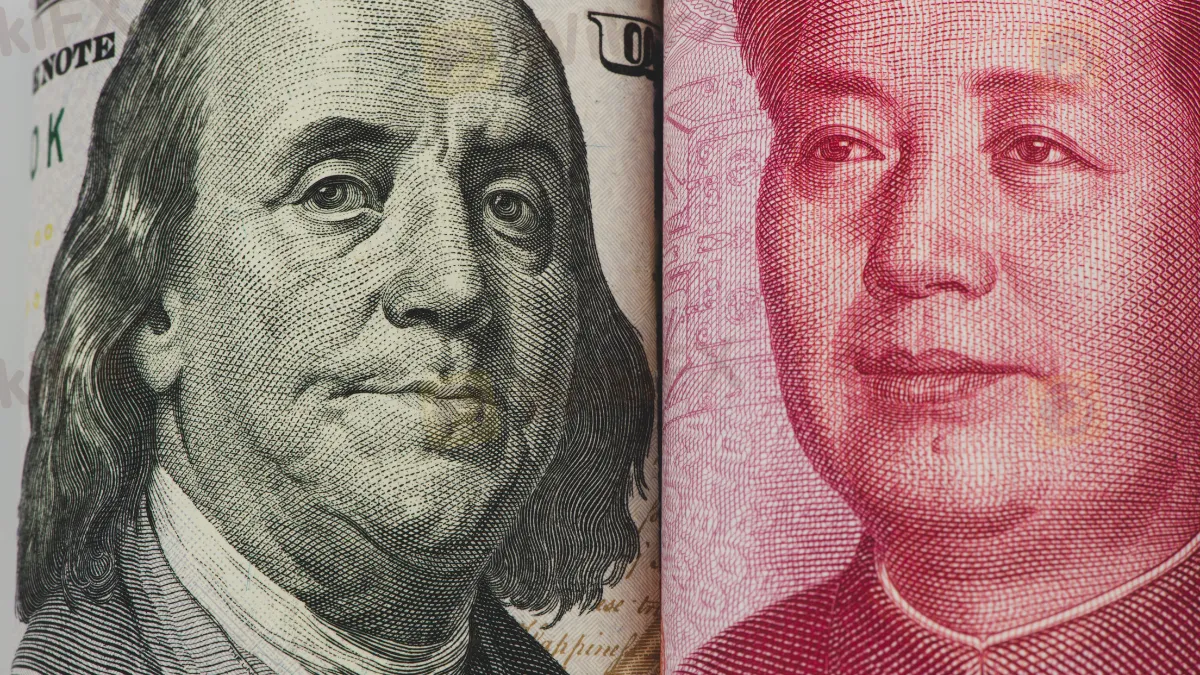简体中文
繁體中文
English
Pусский
日本語
ภาษาไทย
Tiếng Việt
Bahasa Indonesia
Español
हिन्दी
Filippiiniläinen
Français
Deutsch
Português
Türkçe
한국어
العربية
China's New Measures Aim to Stabilize Yuan Against Dollar
Abstract:China's new measures to stabilize the Yuan against the US dollar aim to counter US monetary policy uncertainties and strengthen the currency in the second half of the year.

According to experts, China is planning to adopt fresh steps to stabilize the yuan versus the US dollar, addressing persistent concerns about US monetary policy and strengthening the Chinese currency in the second half of the year.
This forecast follows the yuan's recent slide to its lowest level versus the US dollar since November, which was recorded in both onshore and offshore trade on Wednesday.
The offshore yuan fell to 7.3115 versus the US dollar in the morning, breaching the crucial 7.31 level, while the onshore yuan finished at 7.2734 around 16:30, down 20 basis points from the previous day.
The yuan has been under pressure since early June, owing to worries that the US Federal Reserve may postpone interest rate decreases. The dollar index increased 1.16 percent in June to 105.84, before falling slightly to 105.63 on Wednesday afternoon.
Liu Chunsheng, an associate professor at the Central University of Finance and Economics School of International Trade and Economics, believes the yuan's recent weakening is due in part to uncertainty about China's internal economic recovery.
Looking forward, Liu expects the yuan to range between 7.1 and 7.3 percent versus the dollar, with the Fed perhaps keeping key interest rates as high as 5.25 to 5.5 percent for the rest of the year.

On Tuesday, Federal Reserve Chair Jerome Powell said that, although recent statistics indicate that US inflation is on the decline, the Fed needs more proof before contemplating rate decreases.
To preserve yuan stability, Liu believes officials could cut the foreign currency reserve requirement ratio, expanding onshore dollar liquidity and enhancing expectation management.
He also underlined the significance of more aggressive fiscal and monetary policy in maintaining economic momentum. “Significant fluctuations in economic growth could impact not only the yuan but also the stock and bond markets,” according to Liu.
The People's Bank of China (PBOC) has reaffirmed its commitment to preserving the yuan's overall stability via comprehensive measures while resolutely guarding against the possibility of exchange rate overshoot.
According to Jerry Chen, an analyst at GAIN Capital, the PBOC's move on Monday to borrow Chinese government bonds from main dealers indicates its policy purpose to stabilize the yuan. Selling these bonds may assist avoid a sharp drop in Chinese government bond rates.
“We anticipate the central bank will continue to manage currency challenges in a controlled manner, indicating exchange rate stability via the yuan central parity rate. ”It may also guide market expectations by issuing offshore central bank bills, Chen said.
The Chinese yuan has held up well versus a basket of foreign currencies. The CFETS RMB Index, which analyzes the yuan's exchange rate against a basket of currencies from China's trading partners, increased to 100.04 on Friday from 99.79 at the end of May.
You may also access the daily news here.

Disclaimer:
The views in this article only represent the author's personal views, and do not constitute investment advice on this platform. This platform does not guarantee the accuracy, completeness and timeliness of the information in the article, and will not be liable for any loss caused by the use of or reliance on the information in the article.
Read more

The Hidden Checklist: Five Unconventional Steps to Vet Your Broker
Forex broker scams continue to evolve, employing new tactics to appear credible and mislead unsuspecting traders. Identifying these fraudulent schemes requires vigilance and strategies beyond the usual advice. Here are five effective methods to help traders assess the legitimacy of a forex broker and avoid potential pitfalls.

Doo Financial Obtains Licenses in BVI and Cayman Islands
Doo Financial, a subsidiary of Singapore-based Doo Group, has expanded its regulatory footprint by securing new offshore licenses from the British Virgin Islands Financial Services Commission (BVI FSC) and the Cayman Islands Monetary Authority (CIMA).

CFI’s New Initiative Aims to Promote Transparency in Trading
A new programme has been launched by CFI to address the growing need for transparency and awareness in online trading. Named “Trading Transparency+: Empowering Awareness and Clarity in Trading,” the initiative seeks to combat misinformation and equip individuals with resources to evaluate whether trading aligns with their financial goals and circumstances.

Malaysian-Thai Fraud Syndicate Dismantled, Millions in Losses Reported
The Royal Malaysia Police (PDRM) has received 26 reports concerning the Nicshare and CommonApps investment schemes, both linked to a major fraudulent syndicate led by a Malaysian citizen. The syndicate’s activities came to light following the arrest of its leader by Thai authorities on 16 December.
WikiFX Broker
Latest News
ASIC Sues Binance Australia Derivatives for Misclassifying Retail Clients
Top 10 Trading Indicators Every Forex Trader Should Know
WikiFX Review: Is FxPro Reliable?
Malaysian-Thai Fraud Syndicate Dismantled, Millions in Losses Reported
Trading frauds topped the list of scams in India- Report Reveals
AIMS Broker Review
The Hidden Checklist: Five Unconventional Steps to Vet Your Broker
YAMARKETS' Jingle Bells Christmas Offer!
WikiFX Review: Something You Need to Know About Markets4you
Revolut Leads UK Neobanks in the Digital Banking Revolution
Currency Calculator


